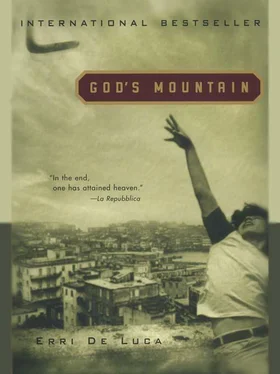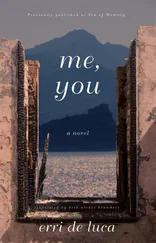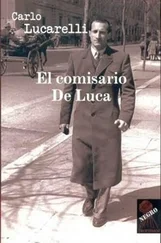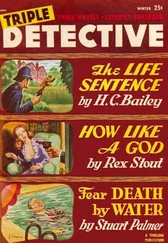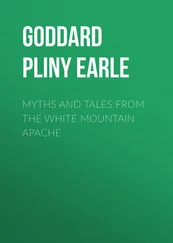THE SMELL of the port has risen all the way to our alley, and I forget my sadness. Master Errico saw how far away I looked and told me to drink some octopus broth. “Te magne ‘a capa e metti giudizio”; eat one and it’ll set your head straight. There’s an octopus vendor at the top of the opposite alley. The only thing he sells is, ’e purpe . Master Errico knows him, knows that he looks for octopus between the square stones of the outer breakwater. “He doesn’t fish for them,” he says. “He goes to pluck them out with his bare hands, like a breeder. He feeds them mussels. The octopus take comfort. He shucks the mussels, and the octopus come right up to him and eat out of his hands. He knows each and every one of them. He calls them by number. He wades into the water, says a number, and an octopus comes up and sticks to his hand. He kills them without hurting them, and the octopus that you get from him doesn’t need to be tenderized. Even the big ones are already tender. He doesn’t sell the little ones, the purpetielli, just the big ones. Go to him and drink the broth.”
AT LUNCHTIME Rafaniello tells me stories about when he used to live in his hometown and was called Rav Daniel. When he was a boy he was apprenticed to a shoemaker, too. The shoemaker was mean, nothing like Master Errico. He didn’t teach him the trade. Truth is, he hid everything from him. Rafaniello had to spy on him. The rest was taught to him in a dream by a shoemaker from the Holy Scriptures of his people. He would come at night and teach him the shoemaker’s art. When Rafaniello was a boy he used to study after work, falling asleep on the open religious books. So it was easy for a saint to come out of the books to help him. The shoemaker in his dreams was named Rav Iohanàn has-sàndler, Master John the shoemaker, and he showed him the art that his boss wouldn’t teach him. “I learned the shoemaker’s trade in the Talmud,” a big holy book from his hometown. Don Rafaniè, you even went to school in your sleep, you never get any rest. At night I can’t figure anything out. Even if Fortune came by with the lottery numbers in her mouth, I’d tell her come back tomorrow. At night I don’t exist for anyone. I sleep like a dead man. My eyes reopen at the same point where I closed them. Every morning is a resurrection.
WE SIT down on the shoe bench. He rubs his hump against the wall. I massage it a little for him. Under his jacket the bones are moving, the wing bones. We confide in each other. I tell him: Women give birth in the front, you’re giving birth in the back. “Men don’t have the honor of giving birth,” he replies. We eat sitting close to each other. He rinses out his mouth and spits, like he does when he’s about to say saintly things. “In my town I was reading the Psalms where you find the question, ‘Who shall ascend into the hill of the Lord?’ and the answer says, ‘He that hath clean hands and a pure heart.’ Then our area was struck by the war. It came from the west, crushing us, burning alive the land and the people. They were enemies I didn’t know we had. I hid underneath animal dung, under a floor, in an abandoned limestone quarry. I resisted, without knowing why I wanted to live while everyone else was dying. I rebelled against dying and cursed it so I could live. I hid, ate, and drank all kinds of things, like boiled tree bark. I stole honey from beehives, drank my own urine mixed with snow. Job’s wife tells him, ‘Curse God and die.’ But I didn’t. Job didn’t either. I didn’t curse God and I’m not dead. The war cleansed my heart and washed my hands with lime. When it ended I was ready to ascend into the hill of the Lord.”

HE TOLD me the rest of the story the next day, while outside it was raining. All the good clean water got wasted, running down to the sea without anyone putting out a kettle to catch some for pasta. Donna Speranza, the caretaker, collects the May rain. She says that it’s good for the eyes. Rafaniello’s tiny voice accompanies the water running down the alleyway. It’s flowing, too. “Along with me, other people of my town emerged from their hiding places. They, too, had been rubbed with lime and made ready for the ascent. We headed south, descending toward Italy, a country that stretches far into the middle of the sea, so beautiful that it’s a shame it ends and doesn’t go farther. We try to embark for the land inscribed in our holy books. We have no passport, no rights, we are the living whom death has rejected. The English close off the sea. They don’t let us go. I have an evil thought. ‘You can keep your hill, keep your Englishmen in Jerusalem, make them your chosen people.’ So He changes his mind. He takes away the English and plays a joke on me for punishment. He takes me to the mount of the Lord, but it’s in Naples. It’s true that here they know how to make perfect copies of antique furniture, luxury watches, and packs of American cigarettes. But copying the mount of the Lord is going too far. It can only be in Jerusalem. Here on top of the hill where you could see the sea and the peak of the volcano, you could fit a panoramic terrace, not the footstool for the feet of God. But they called it Montedidio, the hill of the Lord, and while they were at it, they called the hill next door Montecalvario, so that makes two,” Rafaniello says, and he takes it for a joke, because you have to accept playful punishment, since sometimes God sets men straight by tricking them, that’s what he says. “With all due respect, the Holy Land doesn’t have franchises. In the meantime I’ve stayed here, on the slopes of another hill of the Lord, like a tourist who made the wrong booking.” It must be because of his tiny voice. It must be the effort required to hear every word that makes me hear them again, as I write them, by ear, on the scroll of paper I keep in the evening, punctuated by the driving rain that keeps me away from the washbasins.
A FOREIGN shoemaker knows how to speak Italian so precisely that I’m moved, thinking of my dad who struggles to learn and doesn’t know half as many words as Rafaniello. Did your Italian vocabulary come to you in dreams, too? I ask him. No, he says, he got it from books, reading Pinocchio over and over. I read it, too, I tell him, happy to have found something we’ve done together. He says that in his town Pinocchio would be named Iòsl and would be made out of wood, his whole life dedicated to his creator. “Now you know of my life as Rav Daniel and of the lives of the people from my town who are no longer here. Those who die leave history as a legacy to their children, to their relatives. My people left it to me and to some others. I’m telling you this because I’ll be leaving before long, when this hump of bone and feathers finally cracks.” Don Rafaniè, tell me about Jerusalem, about this place we can’t copy. He cleans out his mouth, spits, then says that he still doesn’t know, but someone told him, “In the city of Jerusalem, death is afraid of being swallowed by life. It’s the only city in the world where death is ashamed of its existence.” He closes his eyes, rocks his neck, he’s already there. It must be a special place, Jerusalem. In Naples death isn’t ashamed of anything.
RAFANIELLO LIKES garlic and oil, not tomato. From his bread with vegetables to my bread with anchovies, the lunch hour goes by. He says I’ve got secrets. He can read my mind, so I don’t say anything. He asks how my mother is doing. I haven’t seen her for a month. Papa doesn’t want me to. He says she’s under a tent with tubes attached and only he can go. To change the subject I say, you know, Don Rafaniè, you took the same journey as Saint Patricia. She wanted to go to Jerusalem, too, and a storm forced her to land in Naples. I tell him the story of the saint. She died young in Naples and left behind miraculous blood. It liquefies and solidifies all the time, even more than Saint Gennaro’s blood. This gets Rafaniello’s interest. Do you want to know how they got Saint Patricia’s blood? One night a worshiper broke open her tomb and with a pair of pliers removed a tooth from the saint to keep as a relic. Though she had been dead for a hundred years, she started to spit blood from her gums. They collected it in glass jars and that’s how the miracle was born. Don Rafaniè, things happen here that if you tell people about them, they think you’re crazy, but they happen anyway. Naples is one big secret. “This is a city of blood,” he says, “like Jerusalem.” I know, I know, people are obsessed with blood here. They put it in their curses, in their insults. They even eat it cooked and then go to worship it in churches. Women are always going around saying, “ ’ O sang ,” bloody this and bloody that. Even the sauce we eat on Sundays is so dark, so thick, it looks like blood. Rafaniello is amused at the mysterious voice I’m using. Mysterious because it’s hoarse.
Читать дальше
